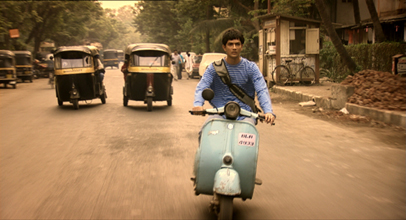Let The Wind Blow
Partho Sen Gupta
Indien / Frankreich 2003

|
" Delphi 12.02. 22.00 |
Produktion: Santocha Productions,
Mystique Media Ltd.
Kontakt: Marie-Cécile Destandau, Santocha
Productions, 8, rue La Bruyère, 75009 Paris
Tel.: (33-1) 42 80 44 45, Fax: 42 80 44 46
E-mail: info@letthewindblow.com
Buch: Partho Sen Gupta, Yogesh Vinayak Joshi
Kamera: Jean-Marc Férrière
Ausstattung: Agnes Vergne
Schnitt: Annick Raoul
Darsteller: Aniket Vishwasrao, Nishikant Kamat,
Tannishtha Chatterjee, Rajashree Thakur
Format: 35mm (von DigiBeta), 1:1.85, Farbe
Länge: 92 Minuten, 25 Bilder/Sek.
Sprache: Hindi, Englisch
India is in the throes of the new global economy. The new capitalist order is changing people’s lives. But a new war of ideals is separating the old values from the new. There is also the war with Pakistan. Eighteen-year-old Arjun lives in the northern suburbs of Bombay with his widowed mother Sheela, who works hard to make ends meet. She has one goal in life: that Arjun earn a diploma. Arjun is attracted to Salma, a girl from a Muslim upperclass family. But deep down he knows that she is beyond his reach. Chabia, 21 years old, is Arjun’s best friend, a mechanic in a garage. He loves Mona, a dancer in a cabaret bar, but he hates seeing those rich men showering her with money as she dances for them. Chabia steals money from his brother and plans to run away with Mona. Arjun fails his diploma examination as he tries to cheat using fake examination papers. Into this situation an old friend returns from abroad. Partho Sen Gupta: ”Let The Wind Blow is an observation, an interrogation and a provocation. It is an observation of the new codes and values of ‘modern’ India; the point of view of the youth of India as opposed to the older generation; the ‘modernisation’ which gives rise to obscurantism; the distancing from a local culture towards an international pop axiom. It is an interrogation of young people’s desires for power and materialism, the advent of individualism in a society once built on community. It is a provocation of those who seem oblivious to the effects of rampant capitalism, political disengagement and the rise of nationalism; a provocation against the danger of a nuclear war, with the power of a thousand suns which would kill and maim millions. And can we really become masters of our destiny?”
Partho Sen Gupta, geb. 1965 in Bombay. Ausbildung zum Filmausstatter, Studium der Filmregie in Paris. Kurzfilme seit 1993: u.a. Le Cochon (1995), Trajet Discontinu (1996), Remember Shakti (2001). Hava aney dey ist sein Spielfilm-Debüt.